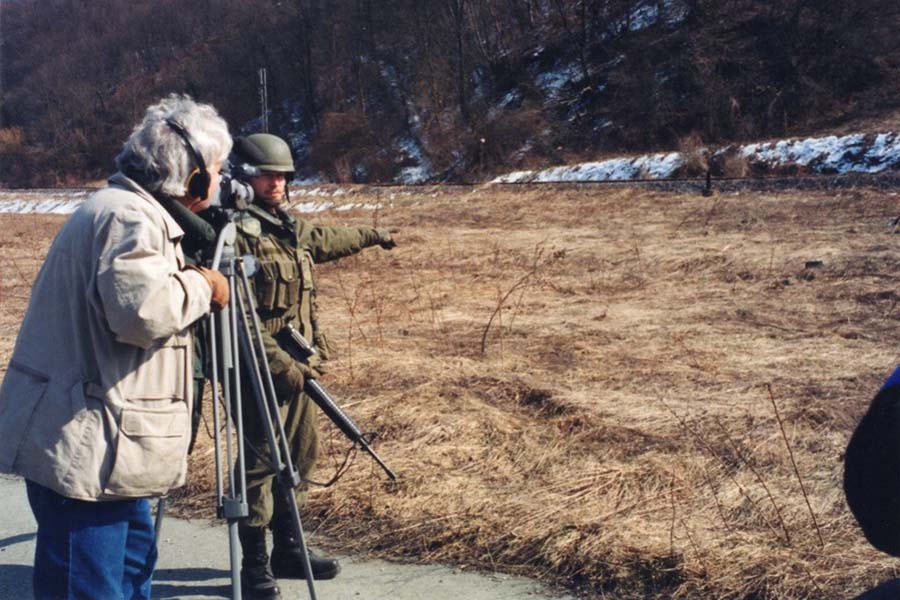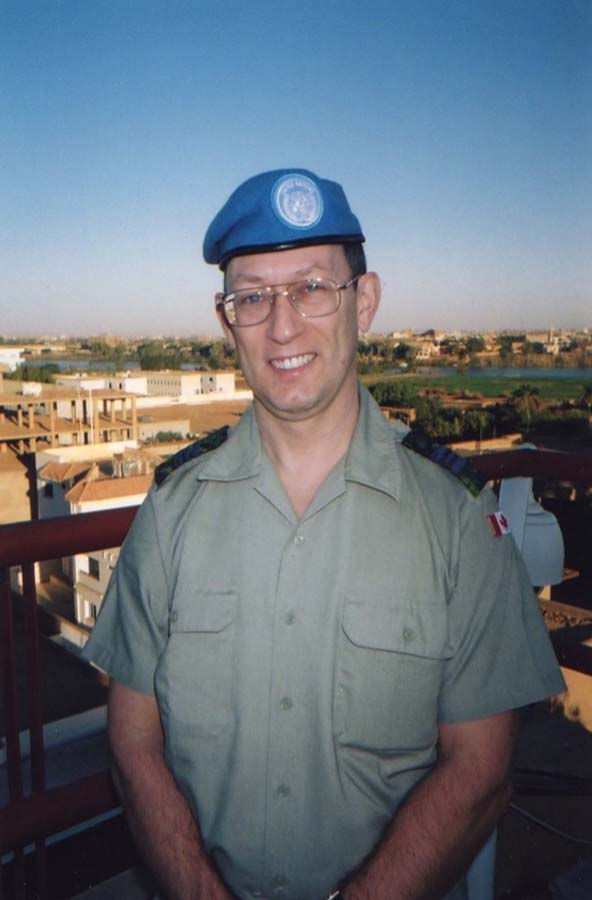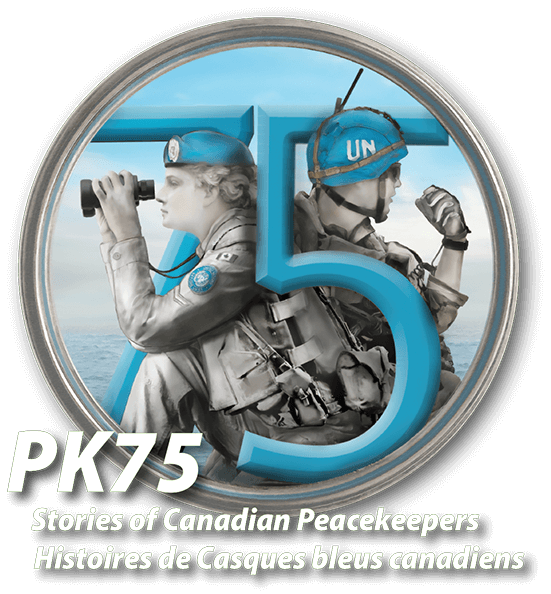



My first exposure to United Nations peacekeeping came in late-1995 when I deployed to Primosten, Croatia, as the Public Affairs Officer (PAO) for the Canadian Logistics Battalion (CANLOGBAT) supporting two battle groups in the Former Republic of Yugoslavia (FRY).
This was during the UN Protection Force’s operations in the strife-torn Balkans, a period when the protracted peace implementation Dayton Accords were being thrashed over, before being signed in December 1995. Although this agreement formally doused several years of inter-ethnic conflict, the scars from the fighting remained all too fresh.
As a PAO, one of my functions was to tell Canadians through news media about the activities of their Canadian Armed Forces (CAF), wherever they were sent, and the Balkans was still a near-top-of-mind story. At the time, the CAF sponsored media visits to our operational theatres, and during my Croatian deployment the CANLOGBAT hosted a visiting broadcast news and radio group.
Members of the media are always seeking content, and so the Battalion’s senior logistics officer and I escorted them to a vacant industrial site in the town of Kistanje, one being considered as a future Canadian base. Despite our van’s UN markings, however, there’s nothing like the sight of a news camera to provoke unwanted interest, the result of which was our vehicle being chased by Croatian paramilitaries down into the battered town’s centre. Thankfully, we were stopped on the main road — and visible to all passing traffic — but our vehicle was blocked as the upset locals demanded our video tape.
This incident went on for most of that day, with us refusing to provide the requested recording, and the paramilitaries becoming increasingly frustrated. In the end, what got us out of that jam was that our Austrian-born TV cameraman smoked through umpteen cigarettes and chatted idly in German with the locals, so much so that they eventually tired of jerking us around. We also finally coughed up a tape — albeit a blank one that we’d furtively swapped out for the actual recording in the field camera. I have no idea whether the locals had a Beta tape player to view it with but, no matter, we were allowed to return to our base.
Subsequently, I redeployed to the Balkans from January through August 1999, this time as the Senior PAO to the Canadian Contingent HQ located in Velika-Kladusa, Bosnia-Herzegovina (our battle group elements were located in Coralici and Zgon, meanwhile, in what was dubbed Operation Palladium).
This time, the conflicts within Croatia and Bosnia were no longer front-page news, so our deployment was a harder ‘sell’ to audiences back home (during this period the international military presence in the FRY would transition from being under UN auspices to the more robust peace enforcement regime of the NATO’s Implementation Force, or IFOR).
Nevertheless, we managed one large, CAF-sponsored media visit into theatre, and succeeded in showcasing our Battle Group’s efforts to patrol and enforce the peace throughout the Canadian Area of Responsibility. Then, one day, the conflict between Serbians and ethnic Albanians in Kosovo to the south turned decidedly hot, and NATO’s priority and focus shifted accordingly. The result was that our story in Bosnia effectively disappeared from public consciousness.
Getting bumped would become a theme again during my next UN deployment. From July 2004 through January 2005, along with the late-Warrant Officer Robert Moug, I served in the military contingent of an advanced UN Mission in Khartoum, the capital of the then-one nation of Sudan.
Much of a PAO’s work is as headquarters-bound staff, and working within a full-blown UN mission, as we did, was fascinating because it featured the full breadth of civilian capabilities and staff functions. It also revealed to me the sheer variety, experience and dedication of individuals, military and civilian alike, committed to the peacekeeping cause.
Getting to work with personnel from other nations is one of the rewards of military service and, in our military contingent, this fine bunch was an even mix from Asian nations and Westerners or ‘Europeans’. Their professionalism and personalities were welcome to witness.
Unfortunately, while our focus was to pave the way for a follow-on mission to implement peace between the Islamist military regime in the North and the African/animist rebels in the South, that would be sidetracked by more newsworthy developments in the country’s West — the humanitarian suffering unfolding in Darfur.
Biography
Major James Simiana (Retired) was born in Oshawa, ON, but grew up in Toronto, the hometown of his mother. He is the son of a native dispatch runner working for British forces on the island of Malta, someone who, like most of that country’s population, managed to survive three years of bombing and strafing by the German and Italian air forces during the Second World War (James credits his existence today to their poor marksmanship back then).
As a Toronto youth, the first uniform he put on in the early-1970s was as an avid member of the Royal Canadian Air Cadets, specifically with 246 Progress Squadron, which paraded then at the former Canadian Forces Staff School at 1107 Avenue Road. The opportunities provided in that national program led him to his first exposure to Canada’s North, a summer camp course in Whitehorse, Yukon, as well as to earning gliders and private pilot’s licenses. In a nod to his future, he also served as editor of the squadron’s newsletter.
That experience inspired him to seek out employment with the Canadian Armed Forces in 1978, aspiring to be an aircraft navigator. That attempt foundered at Canadian Forces Base Downsview, however, when his visual acuity was found to be just off the required standard. Undaunted, and on the advice of a good friend, he enrolled instead in the journalism undergraduate program at Toronto’s Ryerson Polytechnical Institute, graduating in 1983. From that he went on to a variety of writing stints with the Thomson News organization’s Midland Free Press, Cinema Canada magazine, the Tempus Communications public relations agency, TV Ontario, and the Environment portfolio within the provincial Cabinet Office at Queen’s Park.
It was while in that last position, and because of a two-year-old application, that James was then accepted for enrolment as a Direct Entry Officer into the Public Affairs Officer (PAO) occupation within the Canadian Armed Forces. After passing through Basic Training at the age of 30 as the ‘old guy’ in his platoon, his sundry postings within the military PA world would see him involved in internal communications, media relations, public outreach and stakeholder engagement, executive assistant duties, issues management, PA doctrine and planning, support to Joint Task Force 2 special operations, and advice to senior leadership.
Over a 29.5-year Regular Force career in the CAF, all of it as a PAO wearing the uniform of the RCAF, his postings would take him in and out of National Defence Headquarters, Ottawa, to Yellowknife, NT (and throughout Canada’s Arctic), Moncton, NB, and Halifax, NS. In that span, he would also deploy to: Croatia; Bosnia-Herzegovina; Sudan (on Operation Safari); Naples, Italy (on Op Mobile-NATO Unified Protector, for the Libyan mission); Supreme Headquarters Allied Powers Europe HQ in Mons, Belgium (on Op Reassurance), and to Camp Canada at Ali Al Salem Air Base in Kuwait (on Op Impact).
Given the ever-evolving nature of the Information Environment since the 1990s, James was fortunate enough to benefit from several relevant courses: the Information Warfare Operations course at the Joint Forces Staff College, Norfolk, Virginia; and, at the NATO Staff School in Oberammergau, Bavaria, the Command-and-Control Warfare as well as the Information Operations courses.
For his efforts in uniform, James was recognized with the following medals/decorations: the General Service Medal — Expeditionary; the Canadian Peacekeeping Service Medal; the United Nations Special Service Medal; the NATO Medal for the Former Yugoslavia; the Non-Article 5 NATO Medal for Service on Op Unified Protector — Libya; the Canadian Forces Decoration; and the RCAF Commander’s Commendation.
Upon reaching the Canadian military’s compulsory retirement age of 60 in 2020, James doffed his uniform on a Friday and the following Monday appeared in civilian mufti, to continue working in Public Affairs at the Canadian Joint Operations Command HQ in Ottawa. Still a communicator, and still good to go, James is an avid follower of military and civilian aviation, as well as a keen reader of military history.

A Canadian soldier points out an anti-personnel minefield to Global News reporter Claude Adams during a presence patrol in Bosnia, in March 1999.

Major James Simiana in Khartoum, Sudan in January 2005, with the Nile River in the background.


